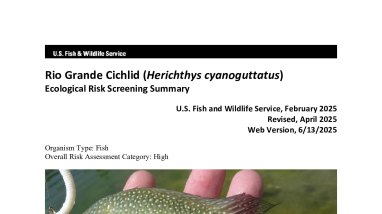Species that are considered high risk have a well-documented history of invasiveness in at least one location globally and are of establishment concern for the contiguous United States based on a climate matching analysis.
Herichthys cyanoguttatus, Rio Grande Cichlid, is a fish that is native to Mexico and southern Texas. This fish can inhabit a wide range of environmental conditions but may be limited by cold water. Breeding pairs will provide parental care of eggs and fry. Herichthys cyanoguttatus is utilized as a sport and food fish and found in the aquarium trade. This species has been introduced and become established outside of its native range, with aquaculture and the aquarium trade being the predominant pathways for introductions. The States of Hawaii and Louisiana regulate Herichthys cyanoguttatus. The History of Invasiveness for Herichthys cyanoguttatus is classified as High due to records of nonnative introductions that have resulted in established populations. Existing research has documented the aggressive behavior of Herichthys cyanoguttatus towards native species, with implications for the reproductive success and population trends of native species. Hybridization with native species has also been reported. The climate matching analysis for the contiguous United States indicates establishment concern for this species outside its native range. Herichthys cyanoguttatus has an overall high climate match with the contiguous United States, with highest matches occurring in the Gulf Coast states and lower matches occurring in most northern and western states. The Certainty of Assessment for this ERSS is classified as High. The Overall Risk Assessment Category for Herichthys cyanoguttatus in the contiguous United States is High.



